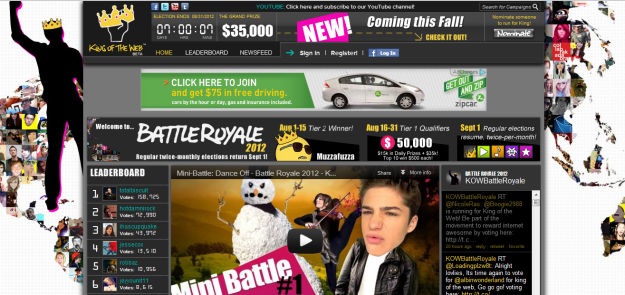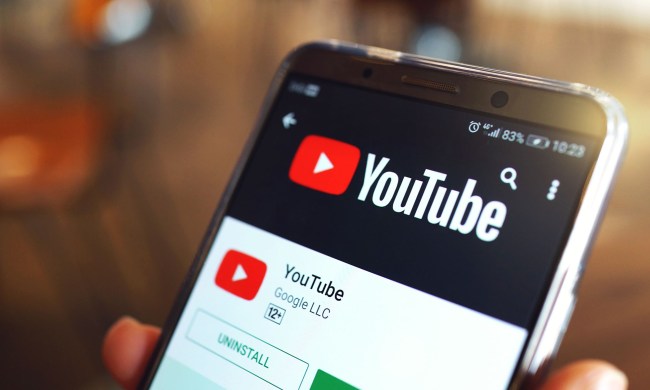
The barriers for fame these days doesn’t require tip offs to paparazzo or trashy reality TV shows. If the emerging YouTube culture has something to show for it, it’s the fact that anyone with a laptop and webcam can become a celebrity — and King of the Web is one platform that can fast track that dream into a reality.
Web personalities are cropping up from all corners of the globe, with names like Mystery Guitar Man, Freddie Wong, and Michelle Phan — and their audience size rivaling that of even some Hollywood A-listers. Their names have a massive, yet loyal, fan base comprised of YouTubers and other onlookers. But what’s unique about these personalities is that they were among the first wave of YouTubers that helped shape YouTube into the Web show and one-off video platform that we know is as today.
In 2012, with innumerable YouTube talent having paved the way for the future generation of YouTubers seeking fame and Web glory, the space in just a matter of several years has been inundated with hopefuls and their content. So how can audiences separate the talent from the rest of the noise? King of the Web is one avenue for discovering the latest sensation and it’s making a splash among YouTubers and audiences alike.
Described as “America’s Got Talent” of the Internet, King of the Web awards cash prizes to the top YouTube talent, as dictated by voters through a real-time voting platform. The “curation” of talent is primarily left up to the audience’s devices, with the assumption that crowdsourcing votes on King of the Web will surface the best talent.
“Through our real-time voting platform, we see those emerging creators and get really good feedback on the vote count on who is inspiring fans,” said Casey Selleck, VP of Marketing and Business Development for King of the Web, in an interview with Digital Trends. “It’s something that we’re excited to see the growth of with the ecosystem that’s growing around YouTube and YouTube creators.”
But what differentiates the Web’s breed of celebrities from the Hollywood types is the fact that the successful YouTubers, with some exceptions, are themselves hardworking, savvy marketers with a knack for branding and social media marketing. Today’s self-made YouTube celebrities are one part diligence, one part creative, and one part savvy marketers. Because of this, few become instant viral hits over night with their first video.
With this in mind, King of the Web’s voting platform is hands-off when it comes to promoting the contestants. It’s entirely up to the contestants to muster support from their fans. And to top the charts among other popular YouTubers on King of the Web requires clever marketing. After all, becoming a Web celebrity isn’t just about recording an incredible skill, spouting witty rhetoric, or making a fool of yourself on camera — there are thousands of others doing just that.
One celebrity YouTube standout that leveraged King of the Web is 25-year-old violinist and dancer Lindsey Sterling. Some non-YouTubers might recognize Sterling from her short-lived performance on “America’s Got Talent,” but the rest of will recognize her for her quirky dancing and violin prowess that has helped her garner over 118 million video views, and over 727,000 subscribers, to date. And, in part, King of the Web helped grow her fan base.
It’s not much of a wonder that YouTubers will flock to King of the Web with cash prizes up for grabs. In a contest called “Battle Royal,” $15,000, over the span of 16 days, between August 16 and 31,will be awarded on a daily basis, leading up to a $35,000 grand prize for the best-of-the-best and the crown of King of the Web.
So, who’s paying for this showering of cash? King of the Web is angel funded by Nick Hanauer, a venture capitalist and Amazon investor; Rich Barton, founder of Expedia; King of the Web’s CEO and founder, Maggie Finch; and Acxiom’s CEO and president, Scott Howe. The platform generates revenue through in-app currencies called “Kingmaker Passes” that enable different types of voter upgrades and, of course, advertising. The former revenue strategy, as Damon Menne, Director of Product Strategy and Analytics at King of the Web, explained to Digital trends, was inspired by the loyalty to King of the Web and support for contestants on the platform.
“Part of why we got into voter upgrades and virtual currencies is that people were asking us, “How do you make money and how do you make sure this thing stays alive?” Menne said. “And some folks will buy 30 packs of these passes even though it would take quite a while to use them all.”
It’s no surprise that the landscape for YouTube has blossomed into the ecosystem where content creators can make a living. But YouTube’s strategy is changing quickly, evidenced by investments in original programming channels and outside production companies, like Machinima. Consequently, there’s a hint of neglect by YouTube for the content creators without a fully developed Web series.
Likewise, while King of the Web’s contestants are comprised primarily of personalities creating one-off videos, the company has recognized this evolution toward Web programming and has begun following the trend. Thankfully, talent is plentiful on King of the Web, and its voting platform guarantees that the top vote recipients will have a sizable fan base to boot. The next step for King of the Web has been in the production of original programming using the top talent surfacing on its platform, and it’s something that the company has already been experimenting with.
To get in on the King of the Web action, click here.


